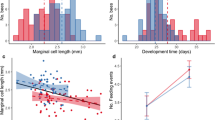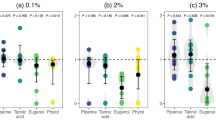Summary
-
1.
Brown honeyeaters (Lichmera indistincta), maintained in the laboratory on artificial nectar (sucrose solution) at an environmental temperature of 20±1°C, drank nectar at a greater rate in the morning than later in the day.
-
2.
Although only a small percentage of the total time between 0630 h (lights-on) and 1800 h (lightsout) was spent in flight,L. indistincta flew more in the morning than during the afternoon.
-
3.
L. indistincta accumulated energy at a relatively steady rate during the day, with the total energy stored approximating that which had been expended the previous night.
-
4.
When birds were switched from 1.6 M to 1.2 M or 0.8 M nectar, their rates of nectar intake increased. Despite variations in rates associated with different birds and times of day,L. indistincta compensated completely, on average, for calorific dilution of nectar. It is suggested that compensation may have been effected by increases in feeding bout frequency and total feeding time.
-
5.
Nectar concentration did not significantly influence the proportion of time spent by birds in flight. Consequently, the mean masses of fat stored byL. indistincta maintained on different nectar regimes were not significantly different.
Similar content being viewed by others
References
Benedictis, P. de, Gill, F.B., Hainsworth, F.R., Pyke, G., Wolf, L.L.: Optimal meal size in hummingbirds. Am. Nat.112, 301–316 (1978)
Collins, B.G.: Seasonal variations in the abundance and food preferences of honeyeaters (Meliphagidae) at Wongamine, Western Australia. West. Aust. Nat. (in press) (1980)
Collins, B.G., Clow, H.: Feeding behaviour and energetics of the Western Spinebill (Acanthorhynchus superciliosis). Aust. J. Zool.26, 269–277 (1978)
Collins, B.G., Morellini, P.: The influence of nectar concentration and time of day upon energy intake and expenditure by the Singing Honeyeater,Meliphaga virescens. Physiol. Zool.52, 165–175 (1979)
Ford, H.A., Paton, D.C.: Resource partitioning and competition in honeyeaters of the genus Meliphaga. Aust. J. Ecol.1, 281–287 (1976)
Frith, H.: Reader's Digest complete book of Australian birds, p. 615. Sydney: Reader's Digest Services 1976
Gill, F.B., Wolf, L.L.: Economics of feeding territoriality in the golden-winged sunbird. Ecology56, 333–345 (1975)
Hainsworth, F.R.: On the tongue of a hummingbird: its role in the rate and energetics of feeding. Comp. Biochem. Physiol.46A, 65–78 (1973)
Hainsworth, F.R.: Food quality and foraging efficiency: the efficiency of sugar assimilation by hummingbirds. J. Comp. Physiol.88, 425–431 (1974)
Hainsworth, F.R.: Feeding: models of costs and benefits in energy regulation. Am. Zool.18, 701–714 (1978)
Hainsworth, F.R., Collins, B.G., Wolf, L.L.: The function of torpor in hummingbirds. Physiol. Zool.50, 215–222 (1977)
Halse, S.A.: Feeding habits of six species of honeyeater in southwestern Australia. Emu78, 145–148 (1978)
Hill, F.W., Dansky, L.M.: Studies of the energy requirements of chickens. I. The effect of dietary energy level on growth and feed consumption. Poultry Sci.33, 112–119 (1954)
Hopper, S.D., Burbidge, A.H.: Assortative pollination by red wattlebirds in a hybrid population ofAnigozanthos Labill. Aust. J. Bot.26, 335–350 (1978)
Jacobs, H.L., Sharma, K.N.: Task versus calories: sensory and metabolic signals in the control of food intake. Ann. N.Y. Acad. Sci.157, 1084–1125 (1969)
Kendeigh, S.C., Kontogiannis, J.E., Mazac, A., Roth, R.R.: Environmental regulation of food intake by birds. Comp. Biochem. Physiol.31, 941–957 (1969)
King, J.R.: Adaptive periodic fat storage by birds. In: Proceedings of the Fifteenth International Ornithological Congress. Voous, K.H. (ed.), pp 200–217. Leiden: Brill 1972
Kleiber, M.: The fire of life: An introduction to animal energetics, p. 454. New York: Wiley 1961
Meier, A.H.: Daily rhythms of lipogenesis in fat and lean white throated sparrowsZonotrichia albicollis. Am. J. Physiol.232, E193–196 (1977)
Stiles, F.G.: Time, energy and territoriality of the Anna Hummingbird (Calypte anna). Science171, 818–821 (1971)
Vogel, A.I.: A textbook of practical organic chemistry, 2nd ed., p. 508. London: Spottiswoode, Ballantyne 1966
Wolf, L.L.: Energy intake and expenditures in a nectar-feeding sunbird. Ecology56, 92–104 (1975)
Wolf, L.L., Hainsworth, F.R.: Temporal patterning of feeding by hummingbirds. Anim. Behav.25, 976–989 (1977)
Wolf, L.L., Hainsworth, F.R.: Energy: expenditures and intakes. In: Chemical zoology, Vol. X. Florkin, M., Scheer, B.T. (eds), pp. 307–358. New York: Academic Press 1978
Wolf, L.L., Hainsworth, F.R., Gill, F.B.: Foraging efficiencies and time budgets of nectar feeding birds. Ecology56, 117–128 (1975)
Author information
Authors and Affiliations
Rights and permissions
About this article
Cite this article
Collins, B.G., Cary, G. & Packard, G. Energy assimilation, expenditure and storage by the brown honeyeater,Lichmera indistincta . J Comp Physiol B 137, 157–163 (1980). https://doi.org/10.1007/BF00689215
Accepted:
Issue Date:
DOI: https://doi.org/10.1007/BF00689215




